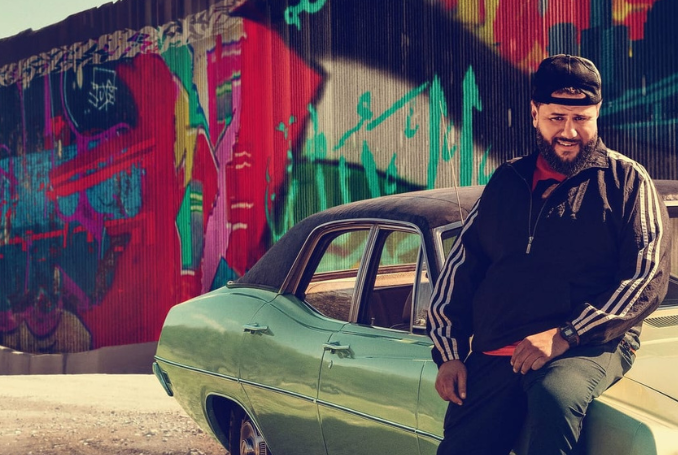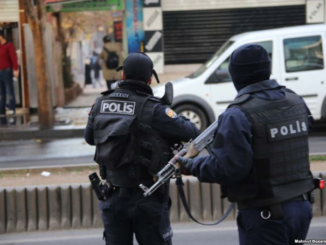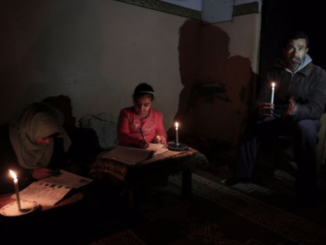
By Benay Blend
“#Mo @netflixis so good. The episodes are witty, engaging & real. Music selections r perfect. Dialogue is authentic. Most of all, it’s quite emotional seeing this representation. It made me realize how deeply our humanity has been excluded & marginalized in popular culture,” tweeted Susan Abulhawa, Palestinian-American writer and activist for Palestine.
The story of a Palestinian immigrant who moved with his family to Texas from Kuwait, Mo translates differently to different reviewers. For non-Arabs, there appears to be an effort to show how this family’s life intersects with American culture. “Some things are universal,” writes Lucy Mangan. “The program entwines the specific and the universal to enrich both sides of his story.”
The phrase “both sides” caught my attention, because it is often used by liberal Zionists to indicate erroneously that there are two equally moral sides to the Palestinian/Israeli “conflict.” In this case, I’m not sure what Mo’s other side might be: the “universal” side. That seems to be the focus of non-Arab reviewers, such as this one, who appreciated the series but nevertheless felt the need to erase the specifics of the series to make it appear more genuinely American.
When Palestinians review the show, there is also appreciation, but in their case it is for placing what Arwa Mawdawi calls the “P-word” at the center of the story. “If you are of Palestinian heritage, as I am,” she says, “Mo is far more than just a laugh: it’s a groundbreaking piece of television.”
“It’s a Branding Issue,” Nada Elia explains, partly because the series rebranded the way that Palestinians are usually covered by the media–as terrorists who cannot possibly be from Palestine because only Israel exists. As a Palestinian she understands the horror Mo feels when confronted with chocolate hummus; how Palestine is so often confused with Pakistan when Mo is asked “where do you come from (because obviously you can’t come from here)”; and the truth of Mo’s mother’s comment: “Its who we are” when olive oil “starts comments and seals deals” throughout the show.
Speaking on this issue, Ramzy Baroud explains:
“There is an absolute and urgent need for the Palestinian people to champion their own story, and to define the nature of solidarity. Without the Palestinian people being the central component of the story, the Palestinian narrative is not owned by the Palestinian people.”
That is Mohammed Amer’s message in his series Mo. Similarly, The Last Earth: A Palestinian Story (2018), Baroud contends, represents “[his] attempt at trying to re-orient the story of Palestine by giving it back to the Palestinian people, because in reality without the Palestinian people there is no story.”
In his introduction to Ghassan Kanafani’s On Zionist Literature (2022), Steven Salaita instructs the reader to “follow the books example and move our comprehension of political material in the internet age from the realm of myth into the more satisfying terrain of material politics (p. xvi).”
In that regard, Mustafa Barghouti declared five years ago that the Oslo Accords (September 13, 1993) was “obsolete,” because Israel never kept its side of the bargain. That it claimed so was indeed a myth. “We have to adopt an alternative strategy to what has failed,” Barghouti said, “which is to change the balance of power” in favor of the Palestinians.
A collection of “engaged Palestinian leaders and intellectuals,” Baroud’s Our Vision for Liberation (2022) presents this kind of vision. By placing Palestinians at its center, it offers a chance “not only to convey the victimization of their people but also to mobilize and empower them as well” (p. xviii).
As an organization that places Palestinian objectives at its core, the Masar Badil (Palestinian Alternative Revolutionary Path Movement) gives voice to this call for action. At its initial conference in October-November 2021, held in Madrid, Spain, participants denounced the “negotiation process,” begun 30 years ago in Madrid, as an “utter failure,” bringing profits to the Zionist regime while leaving the Palestinians with a “culture of defeat” that legitimized security cooperation with Israel.
“So we met as individuals, associations, struggling organizations who defend the Palestinian people’s rights and to discuss how we can work together and build together. We encourage young generations to assume their role, and for Palestinian women to play their role in liberation and return,” recalls Jaldia Abubakra, coordinator of Masar Badil Madrid and a member of Samidoun.
Endorsed by Samidoun Palestinian Prisoners Solidarity Network, the Alkarama Palestinian Women’s Movement, and several other organizations inside and outside the occupied territories, the Masar Badil replaces the previous “path of surrender” with a clear statement of unity and resistance. In a recent release, it called on all leftist, labor union and popular movements and forces to join a demonstration outside the Norwegian Parliament in Oslo on Saturday, September 10, to declare a unified opposition to the Zionist regime and to the “illegitimate” Oslo agreement, conducted without the approval of the Palestinian people.
Significantly, because the Masar Badil invites movements from around the world to join its ranks, activists can no longer engage in the defeatist attitude that there is no feasible path forward for liberation. “If our leftist movements in Palestine, Norway and the world were not able to stop the path of surrender and deception of the Oslo Accords in 1993,” the call explains, “our responsibility today calls upon us to declare a clear position, participate in campaigns and raise our voices together to boycott Zionist colonialism and support the legitimate resistance of the Palestinian people to achieve return and liberation.”
Not only does this movement call for support from internationals, it recognizes the unity of all Palestinians—those in the homeland and beyond—and encourages all to do their part to end the occupation. It’s significant that Al-Awda: The Palestine Right to Return Coalition supports the September 10th rally. “No colonized people have attained their liberation by appealing to their oppressors or achieved justice by uniting with racial supremacy or Zionism,” their statement reads. “The Palestinian people are not an exception, especially as we are subjected to an ongoing genocide.”
In this way, the coalition around the Masar Badil includes a broad swath of the Palestinian population, all united around the general principle of resistance rather than normalization and dialogues with the oppressor. As Khaled Barakat explains, the Palestinian movement and their allies have made it clear that “resistance is the choice of the Palestinian people, not normalization and capitulation to imperialism, Zionism, and reactionary regimes that host US military bases and sign deals with the Israeli occupation.”
Whether in popular culture, literature, or the political arena, Palestinians belong at the center of their story, not on the periphery as seen through the lens of other people. In the coming struggle, “the role of Palestinian communities in exile is a Palestinian role,” claims Barakat, but it is an international role as well. These diasporic groups, he adds,
“have a critical role to play in strengthening campaigns for justice in Palestine in universities, churches, and labor unions and in building deeper links with our Jewish brothers and sisters based on a common commitment to anti-colonialism and social justice, the rejection of Zionism, and support for Palestinian resistance.”
Now more than ever, before the mid-term elections in the States, it’s important to remember that solidarity is not a shawl to wear when it’s cool but can be taken off when it gets too hot. Various candidates have already backtracked on their support for Palestine. On the other hand, Baraket recalls that there is a long history of alliances between global liberation movements and the Palestinian struggle, a coalition that the Masar Badil hopes will strengthen “joint struggle and collective action.”

– Benay Blend earned her doctorate in American Studies from the University of New Mexico. Her scholarly works include Douglas Vakoch and Sam Mickey, Eds. (2017), “’Neither Homeland Nor Exile are Words’: ‘Situated Knowledge’ in the Works of Palestinian and Native American Writers”. She contributed this article to The Palestine Chronicle.







